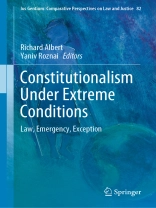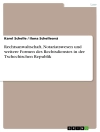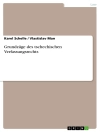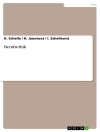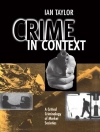This book examines the problem of constitutional change in times of crisis. Divided into five main parts, it both explores and interrogates how public law manages change in periods of extraordinary pressure on the constitution. In Part I, “Emergency, Exception and Normalcy, ” the contributors discuss the practices and methods that could be used to help legitimize the use of emergency powers without compromising the constitutional principles that were created during a period of normalcy. In Part II, “Terrorism and Warfare, ” the contributors assess how constitutions are interpreted during times of war, focusing on the tension between individual rights and safety. Part III, “Public Health, Financial and Economic Crises, ” considers how constitutions change in response to crises that are neither political in the conventional sense nor violent, which also complicates how we evaluate constitutional resilience in times of stress. Part IV, “Constitutionalism for Divided Societies, ” then investigates the pressure on constitutions designed to govern diverse, multi-national populations, and how constitutional structures can facilitate stability and balance in these states. Part V, titled “Constitution-Making and Constitutional Change, ” highlights how constitutions are transformed or created anew during periods of tension. The book concludes with a rich contextual discussion of the pressing challenges facing constitutions in moments of extreme pressure.
Chapter “Public Health Emergencies and Constitutionalism Before COVID-19: Between the National and the International” is available open access under a Creative Commons Attribution 4.0 International License via link.springer.com.
表中的内容
Introduction.- Part I: Emergency, Exception and Normalcy.- Chapter 1. From Institutional Sovereignty to Constitutional Mindset: Rethinking the Domestication of the State of Exception in the Age of Normalization.- Chapter 2.Judicial Review and Emergencies in Post-Marcos Philippines.- Chapter 3. Constitution and Law as Instruments for Normalising Abnormalcy: The Sri Lankan and Indian Experience.- Chapter 4. Political Emergencies as Challenges to the Impartiality of Public Law.- Part II: Terrorism and Warfare.- Chapter 5. Human Rights in Times of Terror – A Judicial Point of View.- Chapter 6. Detaining Unlawful Combatants in Israel: A Matter of Misiniterpretation?.- Chapter 7. The Law Governing the Rights of Enemy Aliens’ Access to Courts.- Chapter 8. Emergencies and Constitutional Rights in a Time of Terror Threat in the Czech Republic: Do We Need a New Dimension of Emergency?.- Part III: Constitution-Making and Constitutional Change.- Chapter 9. Authoritative Constitution-Making in the Name of Democracy?.- Chapter 10. Again: From 1867 to Today, Making a Constitution Under an Elite Umbrella in Turkey.- Chapter 11. Constitution-Making, Political Transition and Reconciliation in Tunisia and Egypt: A Comparative Perspective.- Chapter 12. Security Sector Reform in Timor-Leste After the Constitutional Exception.- Part IV: Constitutionalism for Divided Societies.- Chapter 13. The Constitutionalism of Emergency: Multinationalism Behind Asymmetrical Constitutional Arrangements.- Chapter 14. The Paradox of Territorial Autonomy: How Subnational Representation Leads to Secessionist Preferences.- Chapter 15. Entrenching Hegemony in Cyprus: The Doctrine of Necessity and the Principle of Bicommunality.- Part V: Public Health, Financial and Economic Crises.- Chapter 16. The ‘Judicialization’ of Emergency: The Case of the Eurozone Crisis.- Chapter 17. Financial Crisis as a New Genus of Constitutional Emergency?.- Chapter 18. Public Health Emergencies and Constitutionalism Between the National and the International.- Chapter 19. Conclusion.
关于作者
Richard Albert, the William Stamps Farish Professor in Law and Professor of Government at the University of Texas at Austin, has published over 85 scholarly works on constitutionalism, including his most recent book “Constitutional Amendments: Making, Breaking, and Changing Constitutions” (OUP 2019). He has held visiting faculty appointments at Yale University, the University of Toronto, FGV Direito SP in Brazil, the Externado University of Colombia, and the Interdisciplinary Center in Israel. A graduate of Yale, Oxford and Harvard, he is a former law clerk to the Chief Justice of Canada, a founding Co-Editor of I-CONnect, and the founding Director of the International Forum on the Future of Constitutionalism.
Yaniv Roznai, Associate Professor at the Harry Radzyner Law School, Interdisciplinary Center (IDC) Herzliya, is the leading authority on the theory and doctrine of unconstitutional constitutional amendment. He is a graduate of IDC and the London School of Economics, where he obtained his Ph D that was awarded the European Group of Public Law’s Thesis Prize. He has held fellowships at Princeton University, New York University and the University of Haifa. His books include “Unconstitutional Constitutional Amendments – The Limits of Amendment Powers” (OUP, 2017), which was awarded the Inaugural International Society for Public Law (ICONS) Book Prize, and ‘Constitutional Revolution’ (Yale University Press, 2020) (with Gary Jacobsohn).
